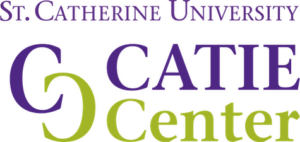Notice of Program Ending: Project Level Up
CATIE Center – St. Catherine University – U.S. Department of Education,
Rehabilitation Services Administration
Award #H160D210004
It is with sincere gratitude—and deep regret—that we announce the ending of
Project Level Up. Due to a non-renewal of federal funding from the U.S. Department
of Education’s Rehabilitation Services Administration, all programming associated
with this grant will officially end on September 30, 2025.
Over the past several years, this program has worked to increase the capacity and
confidence of ASL-English interpreters in healthcare settings, with a particular focus
on practitioners in underrepresented communities. We are proud of the thousands of
interpreters who engaged in our trainings, modules, mentorships, and resources—
and who have gone on to serve diverse patient populations with cultural and
linguistic integrity.
This work would not have been possible without the commitment of our instructional
teams, mentors, evaluators, Deaf and hearing consultants, and administrative staff.
We extend heartfelt thanks to our partners, participants, and the broader interpreting
and healthcare communities who made this work not only possible, but impactful.
The CATIE Center Remains Active and Open
While this chapter of federal funding comes to a close, we remain hopeful about the
future of interpreter education, especially in healthcare. We urge the interpreting
community to carry forward the mission and values of this project: equity, access,
professional excellence, and Deaf-centered collaboration.
We want to emphasize that the CATIE Center remains open and active. There is no
impact to other initiatives or programs, including Project Dive In and the ASL
Interpreting Department at St. Catherine University.
Level Up Dissemination
All of the resources we offered during our grant cycle is available in Canvas Commons to use as your own copy or your own learning. Please click on the button below to learn more and gain access to the resources.

